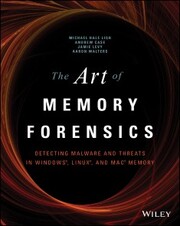Detailansicht
The Art of Memory Forensics
eBook - Detecting Malware and Threats in Windows, Linux, and Mac Memory
Hale Ligh, Michael/Walters, AAron/Case, Andrew et al
ISBN/EAN: 9781118825044
Umbreit-Nr.: 6975144
Sprache:
Englisch
Umfang: 912 S., 14.34 MB
Format in cm:
Einband:
Keine Angabe
Erschienen am 11.07.2014
Auflage: 1/2014
E-Book
Format: PDF
DRM: Adobe DRM
- Zusatztext
- <b>Memory forensics provides cutting edge technology to help investigate digital attacks</b><p>Memory forensics is the art of analyzing computer memory (RAM) to solve digital crimes. As a follow-up to the best seller Malware Analyst's Cookbook, experts in the fields of malware, security, and digital forensics bring you a step-by-step guide to memory forensicsnow the most sought after skill in the digital forensics and incident response fields.</p><p>Beginning with introductory concepts and moving toward the advanced, The Art of Memory Forensics: Detecting Malware and Threats in Windows, Linux, and Mac Memory is based on a five day training course that the authors have presented to hundreds of students. It is the only book on the market that focuses exclusively on memory forensics and how to deploy such techniques properly. Discover memory forensics techniques:</p><ul><li>How volatile memory analysis improves digital investigations</li><li>Proper investigative steps for detecting stealth malware and advanced threats</li><li>How to use free, open source tools for conducting thorough memory forensics</li><li>Ways to acquire memory from suspect systems in a forensically sound manner</li></ul><p>The next era of malware and security breaches are more sophisticated and targeted, and the volatile memory of a computer is often overlooked or destroyed as part of the incident response process. The Art of Memory Forensics explains the latest technological innovations in digital forensics to help bridge this gap. It covers the most popular and recently released versions of Windows, Linux, and Mac, including both the 32 and 64-bit editions.</p>
- Kurztext
- The coastal zone is one of the most dynamic environments on our planet and is much affected by global change, especially sea-level rise. Coastal environments harbour valuable ecosystems, but they are also hugely important from a societal point of view. This book, which draws on the expertise of 21 leading international coastal scientists, represents an up-to-date account of coastal environments and past, present and future impacts of global change. The first chapter of the book outlines key principles that underpin coastal systems and their behaviour. This is followed by a discussion of key processes, including sea level change, sedimentation, storms, waves and tides, that drive coastal change. The main part of the book consists of a discussion of the main coastal environments (beaches, dunes, barriers, salt marshes, tidal flats, estuaries, coral reefs, deltas, rocky and glaciated coasts and coastal groundwater), and how these are affected by global change. The final chapter highlights strategies for coping with coastal change. Readership: final year undergraduate and postgraduate-level students on coastal courses in a wide range subjects, including geography, environmental management, geology, oceanography and coastal/civil engineering. The book will also be a valuable resource for researchers and applied scientists dealing with coastal environments. Additional resources for this book can be found at: www.wiley.com/go/masselink/coastal
- Autorenportrait
- <b>Michael Hale-Ligh</b> is author of Malware Analyst's Cookbook, Secretary/Treasurer of Volatility Foundation, and a world-class reverse engineer.<p><b>Andrew Case</b> is a Digital Forensics Researcher specializing in memory, disk, and network forensics.</p><p><b>Jamie Levy</b>is a Senior Researcher and Developer, targeting memory, network, and malware forensics analysis.</p><p><b>AAron Walters</b> is founder and lead developer of the Volatility Project, President of the Volatility Foundation, and Chair of Open Memory Forensics Workshop.</p>
